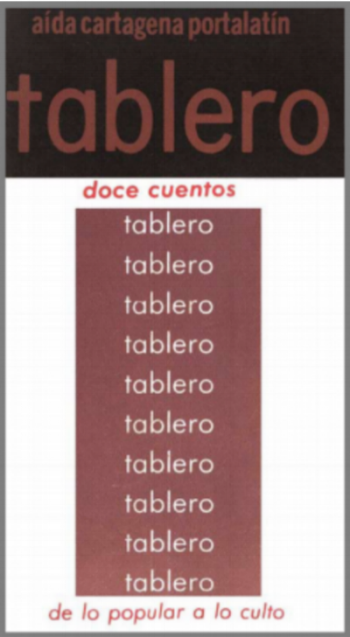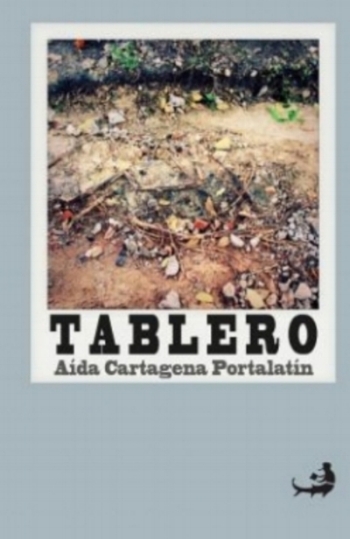By ESENDOM October 11, 2017
Aída Cartagena Portalatín (1918 –1994) was an avant-garde Dominican essayist, cultural worker, poet, novelist, short story writer, art critic and activist. Her earliest poetry book, Vísperas del sueño published in 1944, received rave reviews from literary critics and writers. Aída also collaborated with the surrealist literary group La Poesia Sorprendida.
During the post-dictatorial period in the 1960s, a younger generation of radical artists and writers looked up to Aída for inspiration and support. Part of her literary work, originally written in Spanish, has been disseminated in Italian and English. The following translated works in Italian and English represent a slice of Aída’s varied aesthetic and social interests:
- In 2017, Manuel Paolino, a poet and translator, published his Italian translation of three poems by Aída: Sed del dolor [Thirst of Pain] translated as Sete del dolore. Del sueño al mundo [From Sleep to the World] translated as Dal sogno al mondo, and Vispera del sueño [In the Eve of Sleep] translated as Vigilia del sonno. In these three poems or mini-portraits, the reader find the poet in her most intimate moments. Read these three poems in both Spanish and in the Italian translation by Paolino here.
1978 edition of Tablero (Editora Taller)
- As an Afro-Dominican woman, Aída was quite aware of the racism, oppression and chauvinism of her time. Her short story La llamaban Aurora (Pasión por Donna Summer) translated in English as They Called Her Aurora (A Passion for Donna Summer by Daisy Cocco de Filippis, tracks the footprints of racism, colonialism and gender oppression in Dominican society and the Caribbean through the lens of popular culture.
2014 edition of Tablero (Ediciones Cielonaranja)
Aída's short story appeared in Tablero, a fascinating collection of experimental short stories published in 1978, the same year the Twelve Year dictatorship (1966-1978) of Joaquín Balaguer came to an end; and the same year the former South African Apartheid regime began to show significant cracks. Clearly, and as indicated in some of her work, these two pivotal events impacted Aída’s work and political outlook which saw her on the side of the fight for democratic rights and freedom for artists, writers and ordinary people.
Lizabeth Paravisini-Gebert's English translation of Mambrú no fue a la guerra appeared in Callaloo, Vol. 23, No. 3, Summer, 2000.
- Another short story from the Tablero collection is Mambrú no fue a la guerra translated in English by Lizabeth Paravisini-Gebert as Mambrú Did Not Go To War. This short story encapsulates the marvelous in a stream of conciousness narrative that highlights Aída’s engagement with surrealism. The story starts with a popular folk song in French [Marlbrough s'en va-t-en guerre] that deals with war. Interestingly, the song’s harrowing themes of war, death and destruction became part of the nursery rhyme tradition in the Dominican Republic via Spanish colonialism. As the narration moves along in the streets of the Latin Quarter of Paris, the reader encounters other themes such as the African anti-colonial struggle, sexual liberation and urban precariousness. The story is part travelogue, part social commentary. And the translation is a joy to read.
- The year 1995 saw the publication of the English translation of Yania Tierra (Poema Documento) translated by Rosabelle White and M. J. Fenwick as Yania Tierra: Document Poem. Published in 1981, Yania Tierra is a transgressive text that challenges notions of machismo and masculinity by placing women and people of color and the center of historical progress in Santo Domingo. The importance of this English translation does not lay so much on its quality but on the fact that it makes available to a wider audience a exceptional political work entrenched in a poetics of resistance found in Latin America and the Caribbean. Muito bem/muy bien.
The poem memorias negras by Aída Cartagena Portalatín deals with the 1960 Sharpeville massacre in South Africa. Source: from ANC archives, unknown photographer via Apartheid South Africa.
- Finally, ten poems written by Aída appear in English translation in Praises & Offences : Three Women Poets from the Dominican Republic by Judith Kerman. The selection is quite remakable—not so much the translation— as it provides insight into the evolution of Aída’s poetry. Kerman’s chronological showcase of Aída’s work begins with the 1944 poem Vispera del sueño translated as The Eve of the Dream, and ends with two politically-charged poems from 1984: memorias negras translated as black memories and exterminio gris translated as extermination in gray. Both of these poems deal with state violence and the fight against the Apartheid regime in South Africa. Now, on the translation: this is a translation that, sadly, suffers from a lack of oomph. The music is out of tune. Despite this overall weakness, we should celebrate the fact that these poems were translated, transported from one geographical region to another, that’s quite admiring. Translator, poet and editor Erica Mena deals with the problems facing this particular translation of Aída’s poetry here.
___
Related:
#WomenInTranslation: Interview with Achy Obejas, Writer and Translator
#WomenInTranslation: Interview with Sophie Maríñez, Poet and Translator
#WomenInTranslation: Aurora Arias’s Liberation Song









